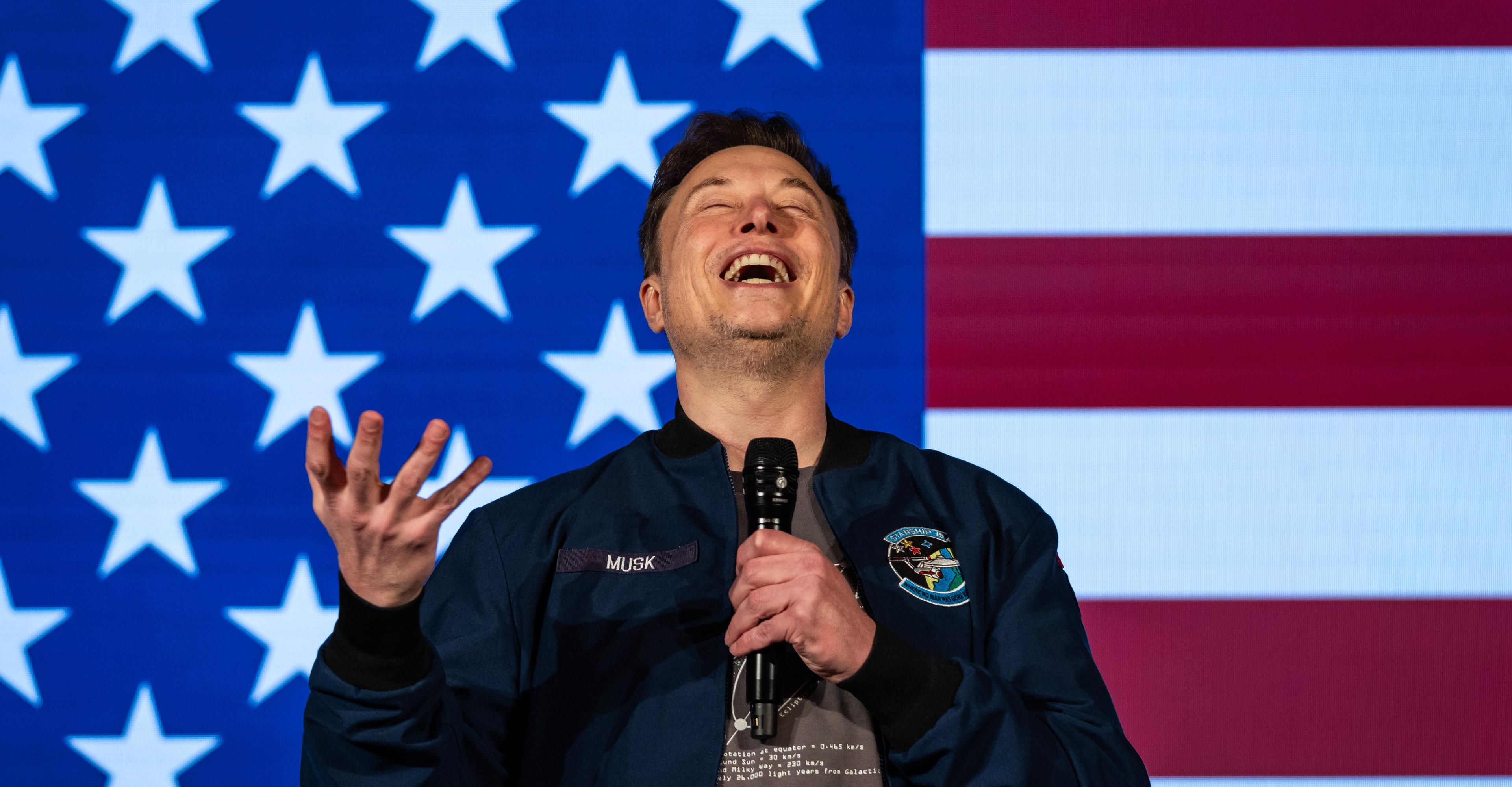Nikki Haley, the one candidate who could still make the GOP primary kinda interesting, explained
How Haley is trying to reject — and co-opt — Trumpism.


Donald Trump leads polls overwhelmingly, Ron DeSantis has gone down in flames, and various other candidates never got off the ground.
But if the GOP presidential primary is to be a serious contest at all — and it’s not yet clear if it is — it’s Nikki Haley who will make it one.
Trump remains the overwhelming favorite to win, with large leads in every early state and positively gigantic leads in national polls.
But Haley has been creeping up in New Hampshire. Recent polls are mixed on just how close she’s come to Trump — one shows her trailing the former president by just 7 points, while another shows her down 20 points. But she has millions in outside spending lined up to try to make that contest, set for January 23, closer. And one rival splitting the anti-Trump vote — Chris Christie — announced Wednesday that he’s quitting the race.
Haley is better positioned than many expect to have a “moment” in the nomination battle, should she do well in New Hampshire. But it’s still very hard to imagine how she could actually defeat Trump. Only if you squint, and make some very optimistic assumptions for her, you could maybe — maybe — see it.
In a field full of also-rans and laughingstocks, though, Haley has ended up being the one Trump challenger who still looks the teensiest bit dangerous as 2024 begins. And the more you know about her political history, the less surprising that is.
Who is Nikki Haley, and how did she rise in politics?
Born to Punjabi Sikh immigrants who’d settled in South Carolina, Haley was born Nimarata Nikki Randhawa. She speaks and writes often about the awkwardness of growing up as one of very few kids who were neither white nor Black in her area at a time when South Carolina life was thoroughly organized around that racial binary. But the accusation that she changed her name in some phony Anglicizing fashion, long spread by her political rivals, is false: she’s gone by Nikki since she was born.
Thank you for the question. Nikki is a Punjabi word that means little one. It’s my middle name on my birth certificate.
As someone who also doesn’t go by their first name, I’m sure you understand. https://t.co/xwEWhyhnnF
While attending Clemson University, Nikki began dating her future husband, Bill Haley, but decided she preferred to call him by his middle name, Michael, instead. She got others to do the same, and the rebranding stuck. She graduated with an accounting degree, and within a few years, she had married and was working on the business side of a women’s clothing company her mother had started. She got involved in local business and women-in-business groups.
Eventually, in 2004, the 31-year-old Haley turned her eye to politics. She decided to run for the state legislature, primarying a Republican incumbent who’d held the seat for three decades — and, surprisingly, won. In the ensuing years, she at first seemed to be climbing the ladder in the statehouse. But the GOP speaker was locked in frequent combat with the state’s Republican governor, Mark Sanford, who wanted bigger spending cuts and conservative policy overhauls. Haley cast her lot with Sanford and became a critic of the speaker, who iced her out of committee posts, throwing her political future into question.
So in 2009, as a still-little-known state legislator, Haley entered the race to succeed the term-limited Sanford the following year. Three more-established white men were already running — the attorney general, the lieutenant governor, and a Congress member — but Haley was counting on a big advantage: The popular Sanford had privately encouraged her to run, and she thought he’d be in her corner. Yet just one month after Haley entered the race, Sanford imploded in scandal (he vanished from the state for six days to conduct an affair in Buenos Aires, with his spokesperson infamously claiming he was hiking the Appalachian Trail). She spent most of the race in fourth place in the polls.
:no_upscale()/cdn.vox-cdn.com/uploads/chorus_asset/file/25206137/GettyImages_102315572.jpg)
But 2010 was the Tea Party year, and Haley played its politics expertly, winning out-of-state endorsements from both Mitt Romney and Sarah Palin, hammering one opponent’s vote for the bank bailout, and branding herself as a different kind of conservative opposed to the corrupt establishment. Then she deftly handled late-breaking claims from two South Carolina GOP operatives that they’d had affairs with her; she denounced their allegations as dirty smear politics, and they never came up with proof. Her support only rose, and she won the primary big (though her first general election win was closer than expected).
Haley’s governorship had its fair share of tumult and scandals, but politically, it was a success for her. She tacked conservative on some issues — for instance, turning down Obamacare’s Medicaid expansion — and eventually avoided a repeat of her bitter primary. But she also won broad popularity by focusing on jobs, helping incentivize Boeing to bring more jobs to the (anti-union) state and winning her 2014 reelection easily while the state’s economy thrived.
Then, after the 2015 Charleston church shooting, when it emerged that the gunman had frequently displayed the Confederate flag, Haley at long last got the flag taken down from the statehouse grounds, winning national attention. The press deemed her a rising star; she criticized Trump during the 2016 primary and endorsed Sen. Marco Rubio (some speculated about a Rubio-Haley ticket).
:no_upscale()/cdn.vox-cdn.com/uploads/chorus_asset/file/25206126/GettyImages_510894394.jpg)
Instead, Trump won. Like most in the GOP, Haley had accommodated herself to his rise and endorsed him, but it was still somewhat surprising when Trump picked her as ambassador to the United Nations, especially since she lacked any foreign policy experience. In her two years in the New York-based post, she talked tough on TV a lot (including about Russia), staunchly supported Israel, and made contacts without needing to be in Washington or run an agency. Persistent rumors claimed that Jared Kushner and Ivanka Trump recommended Trump drop Mike Pence from the 2020 ticket in favor of Haley to appeal to suburban women.
That didn’t happen, so after stepping down from government at the end of 2018, Haley set about making money through speaking fees, consulting, book deals, and board seats (including at Boeing, though Haley hastily quit that post after the company considered taking pandemic aid, with the politics of bailouts likely on her mind).
When the next presidential cycle came around, Trump’s presence in the race didn’t deter her from launching another underdog campaign. And, unlike DeSantis, her support has gradually improved rather than declining. In part, that’s because of her charisma, demonstrated in feisty debate performances in which she’s sparred with her male rivals. But unlike DeSantis, who unsuccessfully tried to outflank Trump from the right, Haley pursued a different strategy based on appealing to more traditional Republican voters.
What does Nikki Haley actually stand for?
On the issues, Haley is a relatively standard early 2010s Republican who has done little to alter her ideology for the Trump era. Indeed, that’s her appeal to many of her backers: that she’s essentially a return to how the GOP used to be.
Generally, she’s pro-business and culturally conservative. She says she’ll cut a lot of taxes and slash government spending and has bragged about being a “union buster.” She says she’s “pro-life” but wants to reassure swing voters that she won’t push hugely restrictive policies. She’s complained about trans women and girls competing in girls’ sports, calling it “the women’s issue of our time.” She wants to crack down on illegal immigration but supports “merit-based” immigration.
But Haley stands out for rejecting the Trumpian turn on two major issues.
The first is on entitlement spending. Haley harks back to the era of Paul Ryan in arguing that cuts to Social Security and Medicare are urgently necessary, though she stresses such changes should only affect younger people and not current beneficiaries. This position helped earn Haley the endorsement of billionaire Charles Koch’s political network but would open her up to attacks in the general election. (Trump stood out among Republicans in 2016 for pledging not to touch Social Security or Medicare, but toward the end of his term he said he’d look at changing the programs “at the right time.”)
:no_upscale()/cdn.vox-cdn.com/uploads/chorus_asset/file/25206546/GettyImages_1024855346.jpg)
The second is foreign policy, where Haley sounds like a traditional Republican interventionist hawk. Trump has mused about pulling the US out of NATO, wants to withdraw more troops currently deployed in countries like South Korea, and has refused to commit to aiding Ukraine in its war against Russia. But Haley has championed Ukraine’s cause, said further aid is necessary to counter Russia and China, and wants to admit Ukraine to NATO (even President Biden says now is not the time for that).
One issue on which Haley has not stuck out her neck, though, is Trump’s efforts to steal the 2020 election. She followed a typical mainstream Republican path by criticizing Trump in the days just after the January 6 attack but pivoting within weeks to oppose Trump’s impeachment trial. (“Give the man a break. I mean, move on.”) She’s opposed the prosecutions of Trump and said she’d pardon him if he’s convicted. She’s clearly seen no political benefit in becoming a loud or consistent Trump critic and has avoided doing so, for now.
Okay, does Nikki Haley actually have a chance of winning?
It is easy to see how Haley could have a moment during the early states. It still seems much more difficult to envision her actually beating Donald Trump in 2024.
Let’s start with how she could win. Expectations for her are very low in Iowa on January 15, so even a decent performance there would be covered as a victory by the media.
Next is New Hampshire on January 23. One poll released this week was very encouraging for Haley, showing Trump at 39 percent and Haley at 32 percent. Another poll was less encouraging — it showed Trump at 46 percent and Haley at 26 percent. In both, Chris Christie got 12 percent of the vote.
:no_upscale()/cdn.vox-cdn.com/uploads/chorus_asset/file/25214235/GettyImages_1836283066.jpg)
Still, Haley has lots of outside money trying to improve her numbers further with ads. She also has the endorsement of the state’s governor, Chris Sununu. Additionally, Haley could get a boost from independents or even Democrats, who are permitted to vote in the Granite State GOP primary. And Christie, who polls suggest was drawing some anti-Trump votes away from Haley, just dropped out.
Some past primary frontrunners have seen their national leads suddenly evaporate based on early state results; a Haley victory in New Hampshire would surely give the race a jolt and could puncture the belief that Trump is inevitable. The purported next state for Republicans is Nevada in early February, but there’s a weird situation in that state where Trump and Haley are competing in separate contests on different days (long story). So the real next showdown would be South Carolina, Haley’s home state, on February 24. A further win there would set her up very nicely for Super Tuesday on March 5, and the battle would continue from there.
But there are many reasons to be deeply skeptical that this will happen. Trump is leading national polls by 50 points, and no one with such a lead at this point has ever lost a presidential primary. A national Haley surge relies on the idea that Trump’s support will suddenly collapse, when the closest thing to an iron law of Republican politics in the past decade has been the GOP base’s refusal to ditch Trump. Haley isn’t even currently favored to win South Carolina — she’s trailing Trump by about 30 points there in polls.
Haley also got a series of bad news cycles at just the wrong time for her, due to a very bad answer she gave at a town hall event. Asked what caused the Civil War, she gave a vague answer referring to “the role of government,” and avoided referring directly to slavery. After criticism, she said the next day that “of course the Civil War was about slavery,” but her rivals (including both Trump and Biden) seized on the comments to suggest she dodged the question.
But the biggest problem for Haley may be that she perfectly epitomizes what many Republican donors want for the party, and where many Republican voters in the early 2010s then thought they wanted — but not what the base in the Trump era actually wants. Which means she may well be facing the same limitation Rubio faced in 2016.
:no_upscale()/cdn.vox-cdn.com/uploads/chorus_asset/file/25214239/GettyImages_1048024612.jpg)
If Haley falls short in the presidential contest, attention will quickly turn to whether Trump will pick her as his running mate. There’s been reporting that Trump wants a female running mate, with Haley often mentioned as an option. But she’d face some resistance from important members of Trump’s coalition. Donald Trump Jr. said recently that he would “go to great lengths to make sure” that his father didn’t pick Haley, calling her “a puppet of the establishment,” and Tucker Carlson has made similar comments.
Whatever Trump decides, 2028 would seemingly be an election in which Haley could run again without the big guy on the ballot — but let’s not get ahead of ourselves. New Hampshire still lies ahead, and that will determine whether Haley really will make this race somewhat interesting, or whether she will sputter out like all the other challengers to Trump before her.
Update, January 10, 2024, 6 pm Eastern: This article was originally published on the morning of January 10. It has been updated with the news that Chris Christie dropped out of the presidential race.

The Dreame X40 Ultra robovac is about $700 off, nearly matching its best price
- 6 hours ago
Adil Raja, Sabir Shakir, Wajahat Saeed, Moeed Pirzada get two life terms each in May 9 digital terrorism case
- 19 hours ago
U-19 Tri-Series: Pakistan thrash Afghanistan by 133 runs
- 14 hours ago
Amid MVP chatter, QB Stafford focused on finale
- 18 hours ago

Petkit’s first automatic wet food feeder keeps track of how much your pet eats
- 21 hours ago

26 things we think will happen in 2026
- a day ago
Trump says US will ‘come to their rescue’ if Iran kills protesters
- 19 hours ago

Pakistan regards Taiwan as inalienable part of China: FO
- 19 hours ago

PSX achieves another milestone, surpasses 179,000 points
- 19 hours ago
49ers' Kittle (ankle) 'absolutely' expects to play
- 18 hours ago

Elon Musk created a monster that’s tearing the right apart
- 4 hours ago

How to kill a rogue AI
- 4 hours ago






